Application of simulated nature intervention using virtual reality and aromatherapy on experiences of residents in a retirement community
Rebekah Vanzo, Mikayla Moore, Brandon Mantell
Master of Occupational Therapy
Advisors: Amy Russell-Yun, OTD, OTR/L and Andy Peachey, Dr.PH
The number of individuals in the United States aged 85+ is ever growing, with increasing numbers living in retirement communities. Residents with limited mobility may be at risk for sensory and occupational deprivation, but literature regarding their sensory and occupational experiences is sparse. The first purpose of this research is to better understand the lived experiences of retirement community dwelling individuals. Engagement with nature has been shown to have stress relieving benefits, but venturing outdoors can be unsafe or challenging for older people with limited mobility. Sensory based interventions such as virtual reality (VR) and aromatherapy have also shown promise for alleviating stress, but the outcomes of such interventions have not been thoroughly investigated with community dwelling older adults. The second purpose of this research is to examine the effectiveness of a simulated nature intervention composed of virtual reality imagery and aromatherapy in reducing stress for this population. In a descriptive study featuring pretest-posttest design and phenomenological interviewing, 11 participants were interviewed about their sensory and occupational experiences and received four five-minute sessions of a nature-based VR and aromatherapy intervention. Outcomes were measured using a heart rate and blood pressure cuff and Perceived Stress Scale-14. Emerging themes from interviews included limitations, levels of support, changes in occupation, resilience, and positive and negative sensory experiences; there was evidence that some residents were experiencing elements of sensory and occupational deprivation. While heart rate and perceived stress had no significant changes, decreases in blood pressure were statistically significant (p < .05) over some intervention sessions. Considering the brevity of our intervention, we conclude that the results indicate promise for this intervention reducing stress for this population, and recommend further research into optimal dosage.

